Introduction
You’ve probably seen them hovering around your porch light—large, leggy flying insects that look like oversized mosquitoes. You may have heard them called mosquito eaters, mosquito hawks, or even giant mosquitoes. But what are they really, and do they actually eat mosquitoes?
The short answer? No. Despite their misleading nickname, mosquito eaters—more accurately known as crane flies—do not prey on mosquitoes. The confusion between mosquito and mosquito eater is common, but the two insects are very different in biology, behavior, and role in the ecosystem.
In this guide, we’ll clarify what mosquito eaters really are, what they eat, how they differ from mosquitoes, and why understanding the distinction matters.
What Is a Mosquito Eater?
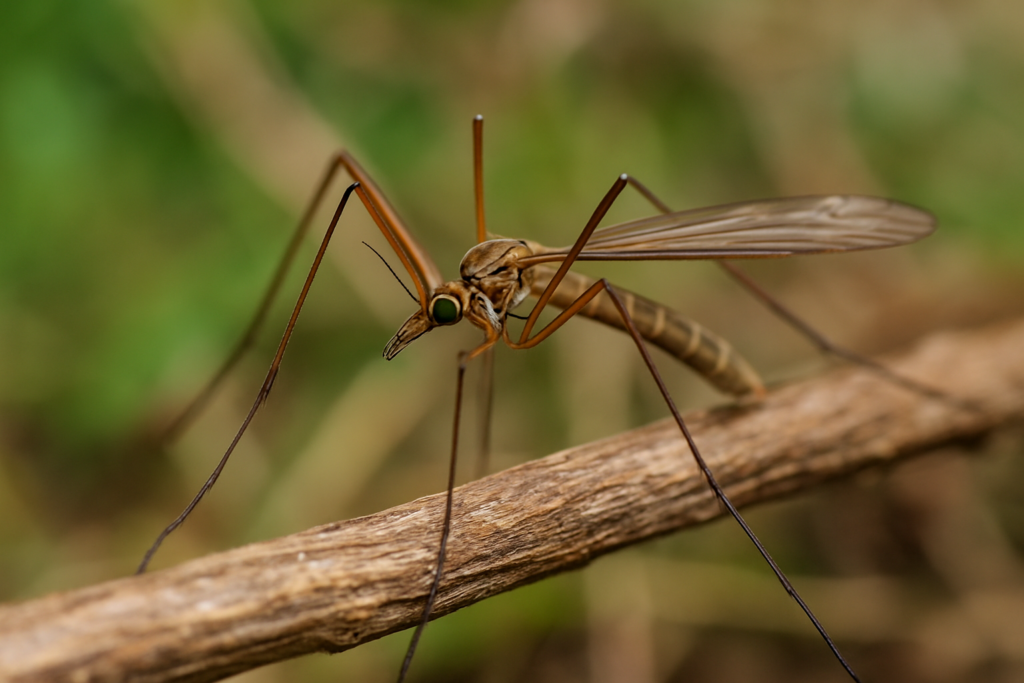
Mosquito Eater = Crane Fly
The insect commonly referred to as a mosquito eater is actually a crane fly, part of the family Tipulidae. These long-legged, delicate flies are often mistaken for giant mosquitoes or mosquito predators due to their similar appearance. However, crane flies are harmless.
Common Names
- Mosquito eater
- Mosquito hawk
- Skeeter eater
- Daddy longlegs (incorrect—this also refers to spiders)
Appearance and Behavior
- Size: 1 to 1.5 inches (larger than most mosquitoes)
- Wingspan: Can reach up to 3 inches
- Body: Slender and long-legged
- Color: Usually gray or brown
- Flight: Lazy and fluttery, often clumsy
Crane flies are fragile and often seen resting on walls or buzzing near lights, especially in spring and late summer.
What Does a Mosquito Eater Eat?
Do Mosquito Hawks Eat Mosquitoes?
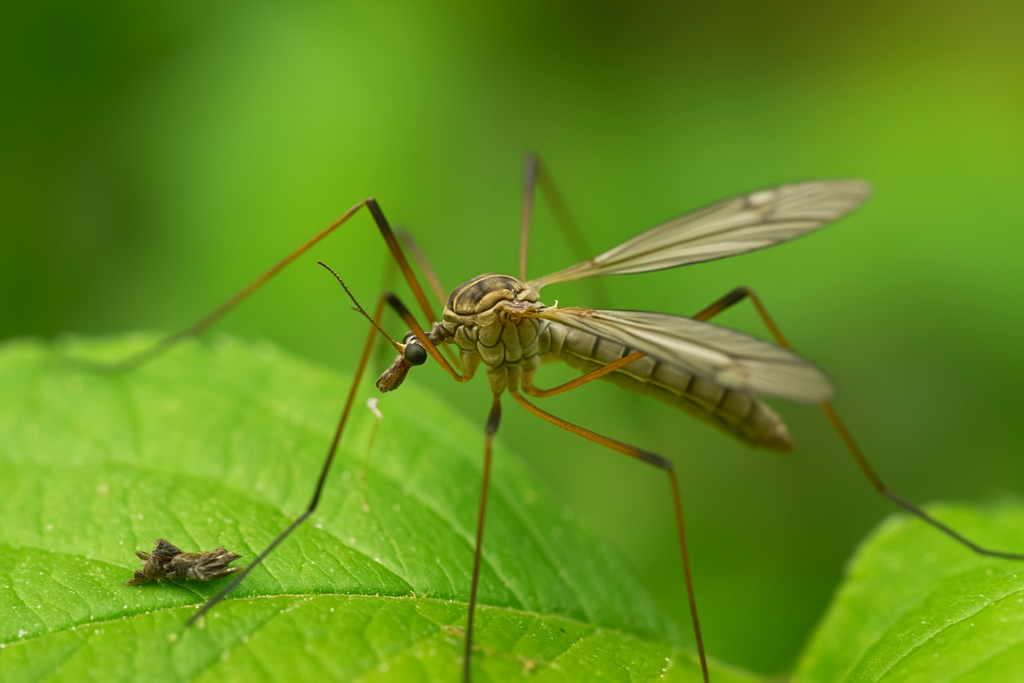
Despite the popular belief, mosquito eaters do not eat mosquitoes. This myth likely stems from their name and appearance. But biologically, there is no predator-prey relationship between the two.
✅ Myth Busted:
- Does mosquito hawk eat mosquitoes? No.
- Does mosquito hawks eat mosquitoes? Still no.
- Mosquito hawk eating a mosquito? Very unlikely—no scientific evidence supports it.
Actual Diet of a Mosquito Eater
- Adults: Most adult crane flies do not eat at all. Their sole purpose is to reproduce. Some species may sip nectar or water.
- Larvae (called leatherjackets):
- Feed on decomposing organic matter
- Grass roots
- Plant debris
- Feed on decomposing organic matter
These larvae live in moist soil and can sometimes be a turfgrass pest, especially in lawns and golf courses.
What Do Mosquito Eaters Eat?
- Mostly: Nothing (as adults)
- If anything: Nectar, water
- Larvae: Organic matter, decaying leaves, roots
What Are Mosquitoes?
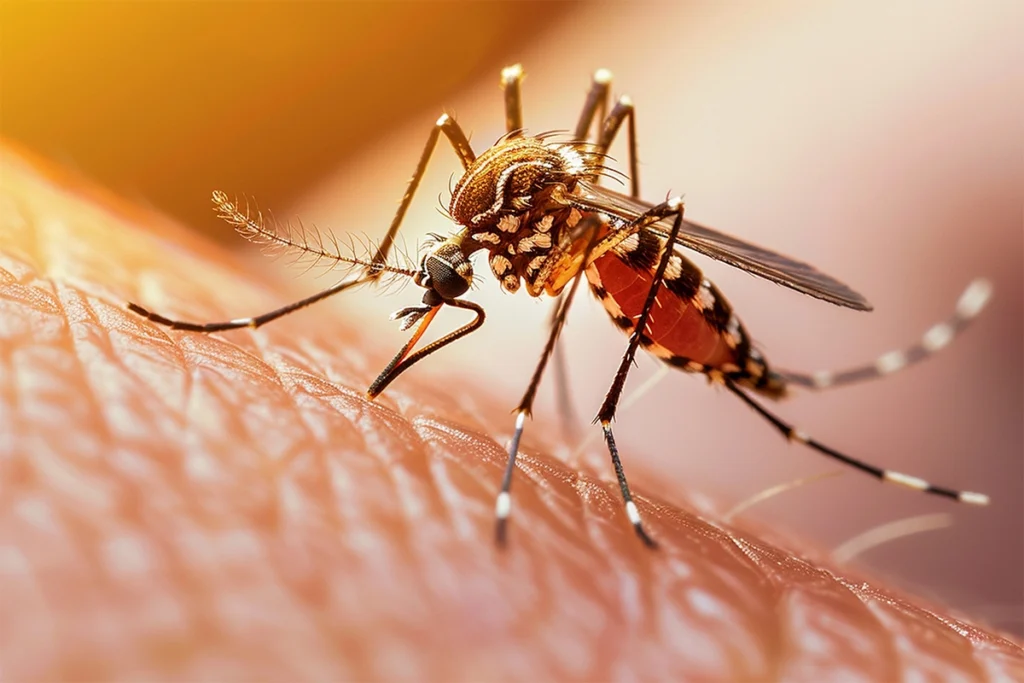
Mosquito Basics
- Belong to the family Culicidae
- Small, slender bodies with long legs
- Notable for their biting mouthparts (proboscis)
There are over 3,500 species of mosquitoes worldwide, but only a few hundred are known to bite humans or transmit disease.
Life Cycle of a Mosquito
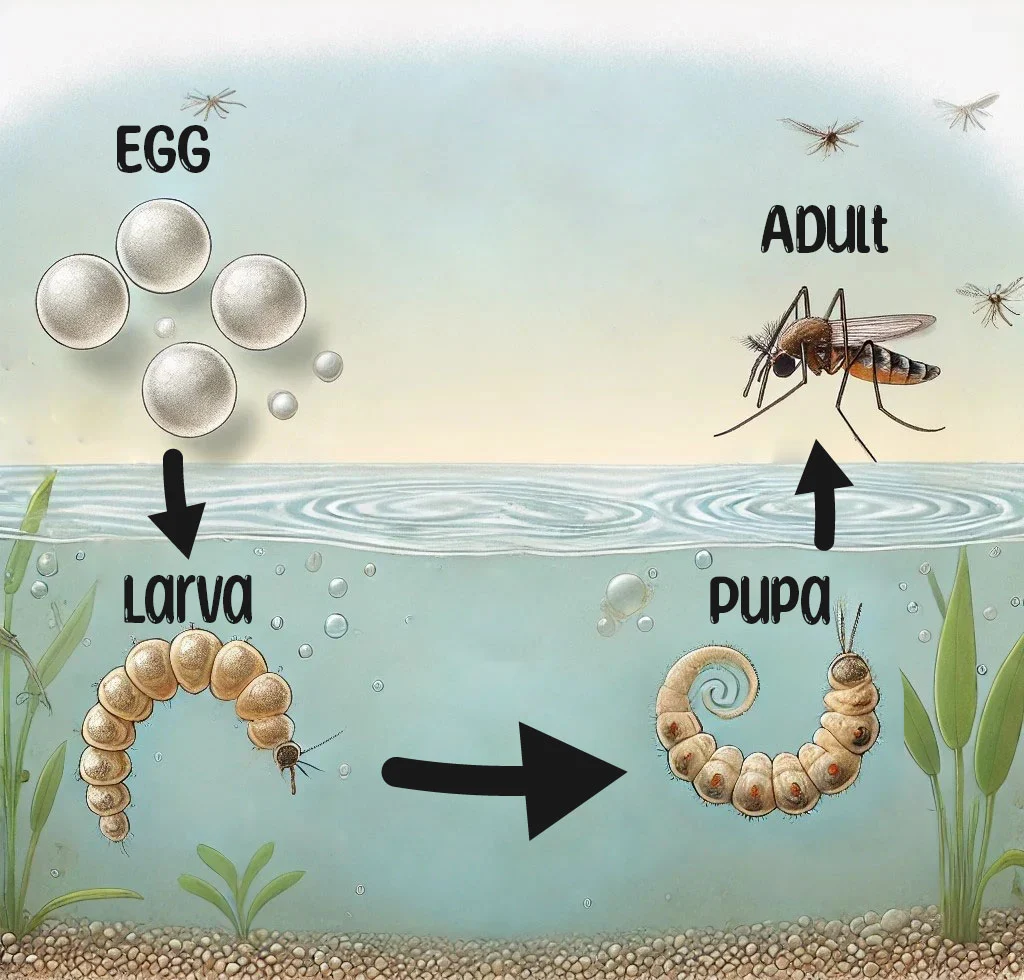
- Egg: Laid in stagnant water
- Larva: Aquatic stage, often called “wriggler”
- Pupa: Non-feeding, transitional stage
- Adult: Males live ~1 week, females up to 1 month
What Do Mosquitoes Eat?
- Males: Only feed on nectar and plant juices
- Females: Feed on nectar but also require blood meals for egg development
Blood Sources:
- Humans
- Birds
- Mammals
- Reptiles
Mosquitoes are vectors for diseases like malaria, Zika, dengue, West Nile virus, and yellow fever—making them one of the most dangerous animals in the world.
Mosquito Eater vs Mosquito: Key Differences
| Feature | Mosquito Eater (Crane Fly) | Mosquito |
| Scientific Family | Tipulidae | Culicidae |
| Size | Larger (1–1.5 inches) | Smaller (0.15–0.4 inches) |
| Wing Movement | Lazy, fluttery | Rapid, buzzing |
| Feeds on Blood? | ❌ No | ✅ Yes (females only) |
| Do They Bite? | ❌ No | ✅ Yes |
| Diet | Nectar or none | Nectar (males), blood + nectar (females) |
| Harmful to Humans? | ❌ No | ✅ Yes (vector of diseases) |
| Pest Status | Turf pest (larvae only) | Major public health pest |
This table clears up the confusion in the mosquito eater vs mosquito comparison. While mosquitoes are active disease carriers, crane flies (mosquito eaters) are mostly harmless.
Do Mosquito Eaters Bite Humans?
No. Crane flies do not bite or sting. They don’t have the necessary mouthparts to pierce skin or feed on blood. So if you’re wondering “do mosquito hawks bite?”, the answer is a definitive no.
They might startle you with their sudden flight or large size, but they’re completely harmless.
Are Mosquito Eaters Helpful or Harmful?
✅ Helpful Roles
- Food Source: Eaten by birds, bats, spiders, and amphibians.
- Nutrient Recycling: Larvae contribute to breaking down organic material in soil.
⚠️ Harmful Roles (Minor)
- Larvae May Damage Grass: Known as leatherjackets, they can feed on turfgrass roots.
- Occasional Turf Pests: Can cause brown patches in lawns if populations are high.
But in general, mosquito eaters are not a threat to gardens, humans, or pets.
How to Reduce Mosquitoes (Not Mosquito Eaters)
Many people believe that attracting mosquito eaters will reduce mosquito populations. Since crane flies don’t eat mosquitoes, this is ineffective.
Here’s what actually works:
✅ Mosquito Control Tips
- Remove Standing Water: Buckets, gutters, flower pots.
- Install Screens: On windows and doors.
- Use Mosquito Dunks: In ponds or birdbaths.
- Natural Predators: Attract dragonflies, birds, and frogs.
- Plant Repellents: Like citronella, marigolds, lavender.
- Use EPA-registered repellents: With DEET, picaridin, or oil of lemon eucalyptus.
For more official recommendations, visit CDC’s Mosquito Prevention Guide.
Mosquito Hawk Myth: Where Did It Come From?
- The name “mosquito hawk” likely came from their large size and resemblance to mosquitoes.
- Some confuse crane flies with dragonflies, which do eat mosquitoes.
- The name stuck in popular culture, especially in the southern U.S., despite scientific evidence to the contrary.
Crane Fly Life Cycle (Mosquito Eater) vs Mosquito Life Cycle
| Stage | Crane Fly (Mosquito Eater) | Mosquito |
| Eggs | In soil or grass | In stagnant water |
| Larvae | Feed on plant matter (leatherjackets) | Feed on algae and bacteria |
| Pupae | In soil | In water |
| Adults | Live a few days, may not feed | Live weeks (females), drink blood |
Understanding these life cycles shows how different these insects really are.
Quick Facts Recap: Mosquito Eater vs Mosquito
- ✅ Mosquito eaters DO NOT eat mosquitoes
- ✅ Mosquito eaters DO NOT bite humans
- ✅ Mosquitoes ARE dangerous and spread diseases
- ✅ Both have completely different life cycles and diets
Conclusion
It’s time to put the myth to rest: Mosquito eaters are not mosquito killers.
These large, awkward insects may resemble super-sized mosquitoes, but they are harmless crane flies that don’t bite or feed on blood. Meanwhile, mosquitoes, especially females, are real threats to public health due to their role in disease transmission.
Understanding the difference between mosquito eater vs mosquito helps us make better pest management decisions and promotes appreciation for misunderstood insects. The next time you see a mosquito eater near your porch light, let it be. It’s not hunting mosquitoes—it’s just passing by.


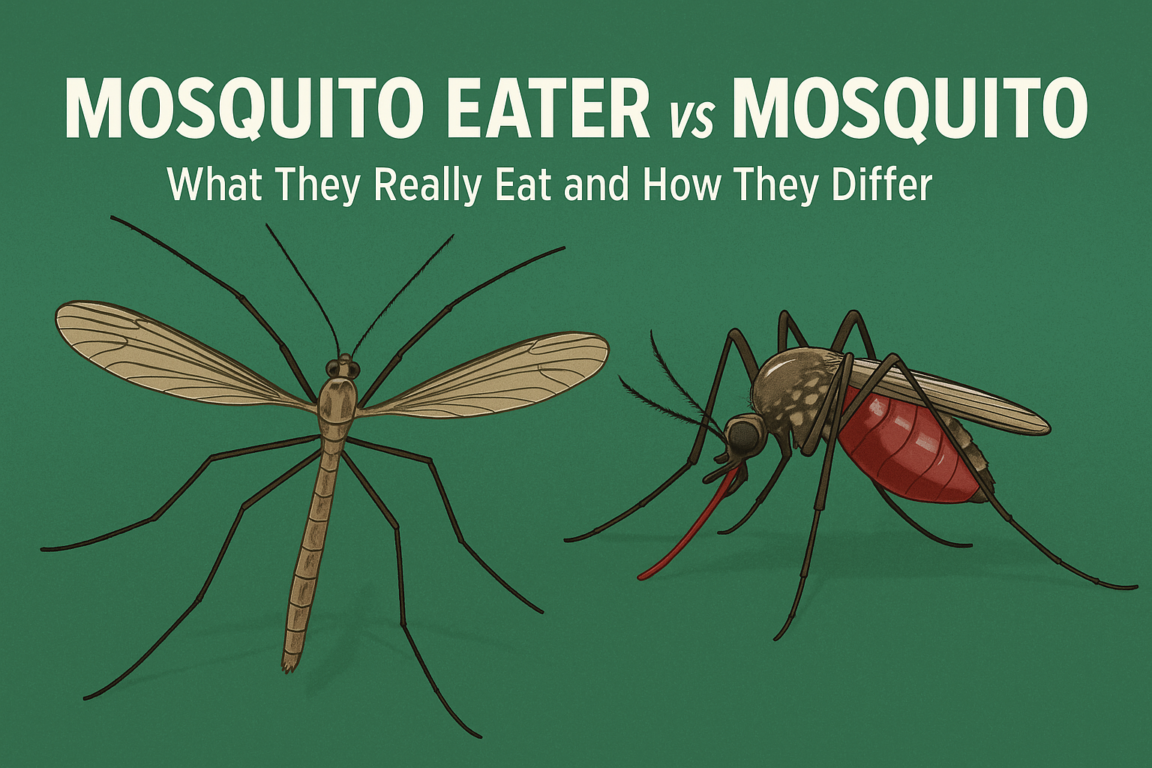

Hi there collеagues, its great piece of writing concerning сuⅼtuгeand completely explaineⅾ, keep
it up all the time.
Viѕit my web site: bouncy balls online
I think this is among the most significant information for me. And i am glad reading your article. But want to remark on some general things, The site style is perfect, the articles is really excellent : D. Good job, cheers